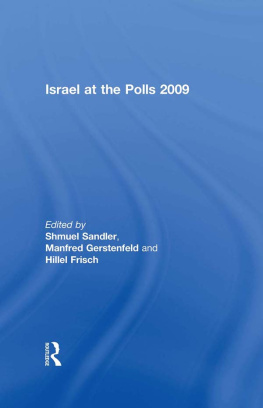New Media, Politics and Society in Israel
The book addresses the social and political landscape of Internet usage in Israel, and studies the formation of a networked information society in the "hi-tech nation". Because Israel is considered a highly developed hi-tech country it could serve as a model to assess and compare the performance and prospects of the Internet in other countries as well.
Chapter address a range of issues, including the diffusion of Internet to Israel, religion and the Internet in the Israeli Jewish Context, Internet-based planned encounters between Israeli-Jews and Palestinians and between Jews and Arabs in Israel, online journalism and user-generated content, Israeli public relations online, Internet usage by Israeli parliamentarians, parties and candidates, as well as audiences, and the facilitation of personalized politics through personal sites of politicians.
This book was originally published as a special issue of Israel Affairs.
Gideon Doron teaches political science, political communication and public policy at Tel Aviv University. He is the President of the Israeli Association of Political Science, the author of seventeen books and dozens of articles. Prof. Doron served as the chairman of the board of the public council of the second authority for television and regional radio.
Azi Lev-On is the head of the new media track in Ariel University Centre in Israel. Dr. Lev-Ons studies explore behaviours and collective action in computer-mediated environments, employing a variety of methods such as link analysis, surveys and laboratory experiments.
New Media, Politics and Society in Israel
Edited by
Gideon Doron and Azi Lev-On
First published 2012
by Routledge
2 Park Square, Milton Park, Abingdon, Oxon, OX14 4RN
Simultaneously published in the USA and Canada
by Routledge
711 Third Avenue, New York, NY 10017
Routledge is an imprint of the Taylor & Francis Group, an informa business
2012 Taylor & Francis
This book is a reproduction of Israel Affairs, volume 17, issue 3. The Publisher requests to those authors who may be citing this book to state, also, the bibliographical details of the special issue on which the book was based.
All rights reserved. No part of this book may be reprinted or reproduced or utilised in any form or by any electronic, mechanical, or other means, now known or hereafter invented, including photocopying and recording, or in any information storage or retrieval system, without permission in writing from the publishers.
Trademark notice: Product or corporate names may be trademarks or registered trademarks, and are used only for identification and explanation without intent to infringe.
British Library Cataloguing in Publication Data
A catalogue record for this book is available from the British Library
ISBN13: 978-0-415-69576-3
Disclaimer
The publisher would like to make readers aware that the chapters in this book are referred to as articles as they had been in the special issue. The publisher accepts responsibility for any inconsistencies that may have arisen in the course of preparing this volume for print.
Gideon Doron
Department of Political Science, Tel Aviv University, Israel
Introduction
On 22 November 2010 the Lebanese government recycled an old tactic: blame Israel for internal problems. A televised message announced that Israel infiltrated all means of communication utilized in this country, and tapped everybodys telephone conversations, plugging into their messages so as to incriminate all those who could potentially be blamed (i.e. the Islamist Hezbollah and Syria) for the assassination of former Prime Minister Rafiq Hariri in February 2005. In order to, presumably, add credibility to the announcement, the Lebanese government mentioned that the personnel of leading Israeli high-tech company Check Point, which consists of several ex-intelligence officers from unit 8200, were involved in the electronic infiltration. Interestingly, on the very same day, clips from Iranian national television showed leading scientists of the Iranian nuclear project admitting that the delay in the progress of their project was caused by a computer worm installed by the Israelis.
The content of the reports mentioned above may or may not be true, but because they are placed in public contexts some people may believe in them. People in Lebanon and in Iran, as well as in other places, can read in open sources the following information about Israel. A country of just over 7 million people, it attracted in 2008 alone close to $2 billion in venture capital, equivalent to the capital raised by the UKs 61 million citizens or the 145 million people living in Germany and France combined. Israeli high-tech companies are extremely diversified and include computers, security, communications, medical devices, clean-tech, biotech and more. Israel attracts two times more venture capital investments per person than the US and 30 times more than Europe.
People in Lebanon and in Iran can also read that at the beginning of 2009 some 63 Israeli companies were listed in Nasdaq, more than those of any other foreign country. Just for comparison, Check Point Software Technologies, the company mentioned on Lebanese TV, has a market capitalization of $7 billion, and still is not the largest Israeli high-tech company.
The purpose of the articles included in this volume is to shed light and focus on the developments and potential implications of one important dimension of this high-tech nation the Internet. The purpose of this introduction is to set up some theoretical grounds for the study of the implications of the Internet in Israel.
The unknown political end of the Internet revolution
The information revolution, which has been accelerated by the Internet, seems to be still in its infancy. Nonetheless, its impact on the public sphere has already been significant. Presently, a large portion of the relevant information that is commonly required and is being used in politics is available online. The pace of the transition from the traditional modes of communication to the Internet is presumably partly dependent on the adoption of technology in large organizations and by the general public, and on the intensity of the habitual behaviour that characterizes the political media-consuming public. The power of inertia, according to Shachar and Shamir, could be attributed to patterns of political behaviour of many Israelis who are motivated by their habits when they seek information that guides their support for their preferred party. It seems, however, that younger generations may be less tied by habits and more extensively consume information available from websites and online applications than consumers of past generations.
Compared to other Western democracies, the median age of Israelis is very young. Much of the population growth may be attributed to the high life expectancy amongst older Israelis which is partly an outcome of relatively effective health and welfare systems. However, a much greater contribution should be accounted to the extremely high rates of birth amongst, especially, two groups of population: the Moslem Arabs and the Ultra Orthodox Jews. These two highly traditional groups together constitute about one-third of the population, and are the two poorest groups in Israel. Their rate of transition to modern means of communication (e.g. the Internet) seems to be somewhat slower than the transition rates of other groups. The government for its part has no incentive or sense of urgency to supply the relevant schools with the required infrastructure. It is difficult to tell at this stage how well these two groups would integrate in the electronic webs of Israeli society.







